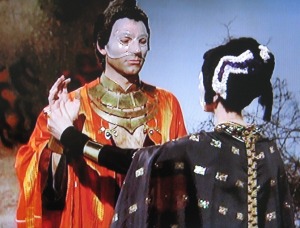Television programmes featuring versions of these plays were made for A307 in the BBC’s Studio A at Alexandra Palace in 1977.
1. Sophocles, Oedipus the King
2. Shakespeare, Macbeth
3. The York Crucifixion and The Brome Abraham and Isaac
4. Carlo Goldoni, The Venetian Twins
5. William Congreve, The Way of the World
6. Alfred Jarry, Ubu Roi
7. Georg Büchner, Woyzeck
8. Henrik Ibsen, Peer Gynt
9. Henrik Ibsen, The Wild Duck
10. Anton Chekhov, Three Sisters
11. August Stindberg, The Ghost Sonata
12. Luigi Pirandello, Six Characters in Search of an Author
13. Bertolt Brecht, The Exception and the Rule
14. Samuel Beckett, Waiting for Godot
15. Jean Genet, The Balcony
16. Athol Fugard, Sizwe Bansi is Dead
Although it was involved in the production process the BBC refused to screen Jean Genet’s play, Le Balcon (The Balcony) which was set in a brothel. The 1971 Agreement between the OU and the BBC gave the latter the right to ‘refuse to transmit any programme or part of a programme which in the opinion of the Corporation contains anything defamatory or likely to bring the Corporation into disrepute’ (Agreement 16 December 1971, Broadcasting File 2, OU Archives, Clause 4, p. 3. Copy in Broadcasting File 2, OU Archives). Despite the right to broadcast, or not, resting with the BBC, the Corporation was rebuked by the OU’s Chancellor at the Alexandra Palace degree ceremony (See Open House, 24 May 1977, Open House, 5 July 1977). For more about the drama made for A307 see Brian Stone and Pat Scorer, Sophocles to Fugard, BBC, London 1977. Brian Stone (1919-95) was the Course Team Chair of A307 and one of the first people to be appointed to the OU. A former actor and director he was made a Reader in English Literature in 1969. Pat Scorer was an OU collague who married Stone in 1985.
 There are many OU students and staff who use Facebook (or similar social media) and there are a number of OU-related groups, including one for members of the OU here, amd ones intended for those with a particular focus, such as the Arts Faculty. Please let us know about other groups and how you use social networks to support your learning or the learning of OU students.
There are many OU students and staff who use Facebook (or similar social media) and there are a number of OU-related groups, including one for members of the OU here, amd ones intended for those with a particular focus, such as the Arts Faculty. Please let us know about other groups and how you use social networks to support your learning or the learning of OU students.



